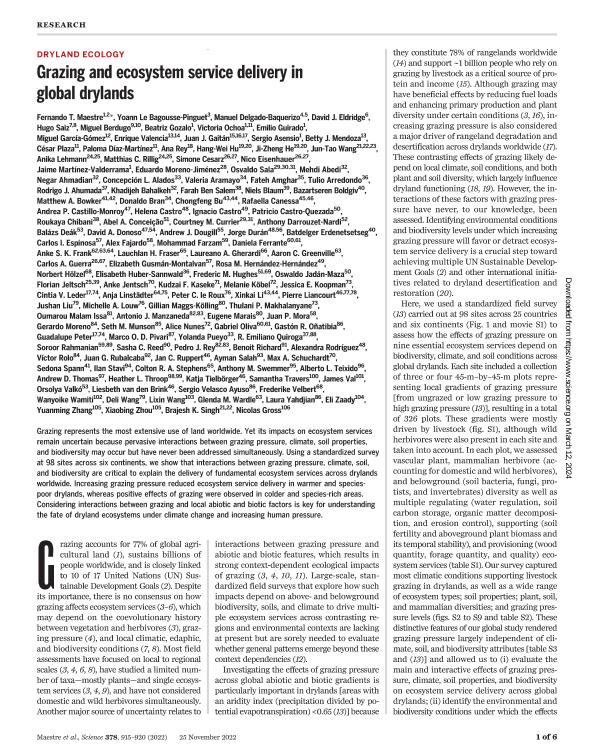Artículo
Grazing pressure, rather than management practice, is key to interpret our results: A response to Manzano et al.
Maestre, Fernando T.; Le Bagousse Pinguet, Yoann; Delgado Baquerizo, Manuel; Eldridge, David J.; Saiz, Hugo; Berdugo, Miguel; Gozalo, Beatriz; Ochoa, Victoria; Guirado, Emilio; García Gómez, Miguel; Valencia, Enrique; Gaitán, Juan José ; Asensio, Sergio; Mendoza, Betty J.; Plaza, Cesar; Díaz Martínez, Paloma; Rey, Ana; Hu, Hang Wei; He, Ji Zheng; Wang, Jun Tao; Lehmann, Anika; Rillig, Matthias C.; Cesarz, Simone; Yahdjian, María Laura
; Asensio, Sergio; Mendoza, Betty J.; Plaza, Cesar; Díaz Martínez, Paloma; Rey, Ana; Hu, Hang Wei; He, Ji Zheng; Wang, Jun Tao; Lehmann, Anika; Rillig, Matthias C.; Cesarz, Simone; Yahdjian, María Laura ; Zaady, Eli; Zhang, Yuanming; Zhou, Xiaobing; Singh, Brajesh K.; Gross, Nicolas
; Zaady, Eli; Zhang, Yuanming; Zhou, Xiaobing; Singh, Brajesh K.; Gross, Nicolas
 ; Asensio, Sergio; Mendoza, Betty J.; Plaza, Cesar; Díaz Martínez, Paloma; Rey, Ana; Hu, Hang Wei; He, Ji Zheng; Wang, Jun Tao; Lehmann, Anika; Rillig, Matthias C.; Cesarz, Simone; Yahdjian, María Laura
; Asensio, Sergio; Mendoza, Betty J.; Plaza, Cesar; Díaz Martínez, Paloma; Rey, Ana; Hu, Hang Wei; He, Ji Zheng; Wang, Jun Tao; Lehmann, Anika; Rillig, Matthias C.; Cesarz, Simone; Yahdjian, María Laura ; Zaady, Eli; Zhang, Yuanming; Zhou, Xiaobing; Singh, Brajesh K.; Gross, Nicolas
; Zaady, Eli; Zhang, Yuanming; Zhou, Xiaobing; Singh, Brajesh K.; Gross, Nicolas
Fecha de publicación:
01/2023
Editorial:
Science Advances is the American Association for the Advancement of Science
Revista:
Science Advances
ISSN:
2375-2548
Idioma:
Inglés
Tipo de recurso:
Artículo publicado
Clasificación temática:
Resumen
Grazing represents the most extensive use of land worldwide. Yet its impacts on ecosystem services remain uncertain because pervasive interactions between grazing pressure, climate, soil properties, and biodiversity may occur but have never been addressed simultaneously. Using a standardized survey at 98 sites across six continents, we show that interactions between grazing pressure, climate, soil, and biodiversity are critical to explain the delivery of fundamental ecosystem services across drylands worldwide. Increasing grazing pressure reduced ecosystem service delivery in warmer and speciespoor drylands, whereas positive effects of grazing were observed in colder and species-rich areas. Considering interactions between grazing and local abiotic and biotic factors is key for understanding the fate of dryland ecosystems under climate change and increasing human pressure.
Palabras clave:
Drylands
,
Grazing
,
Humans
,
Aridity
Archivos asociados
Licencia
Identificadores
Colecciones
Articulos(IFEVA)
Articulos de INST.D/INV.FISIOLOGICAS Y ECO.VINCULADAS A L/AGRIC
Articulos de INST.D/INV.FISIOLOGICAS Y ECO.VINCULADAS A L/AGRIC
Citación
Maestre, Fernando T.; Le Bagousse Pinguet, Yoann; Delgado Baquerizo, Manuel; Eldridge, David J.; Saiz, Hugo; et al.; Grazing pressure, rather than management practice, is key to interpret our results: A response to Manzano et al.; Science Advances is the American Association for the Advancement of Science; Science Advances; 378; 6622; 1-2023; 1-6
Compartir
Altmétricas



